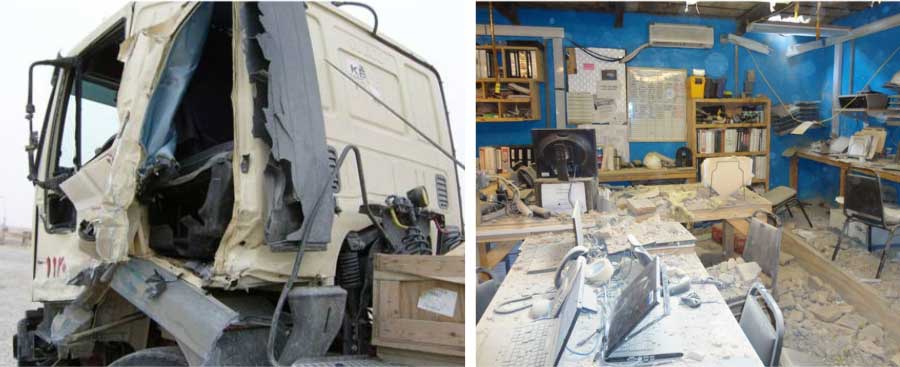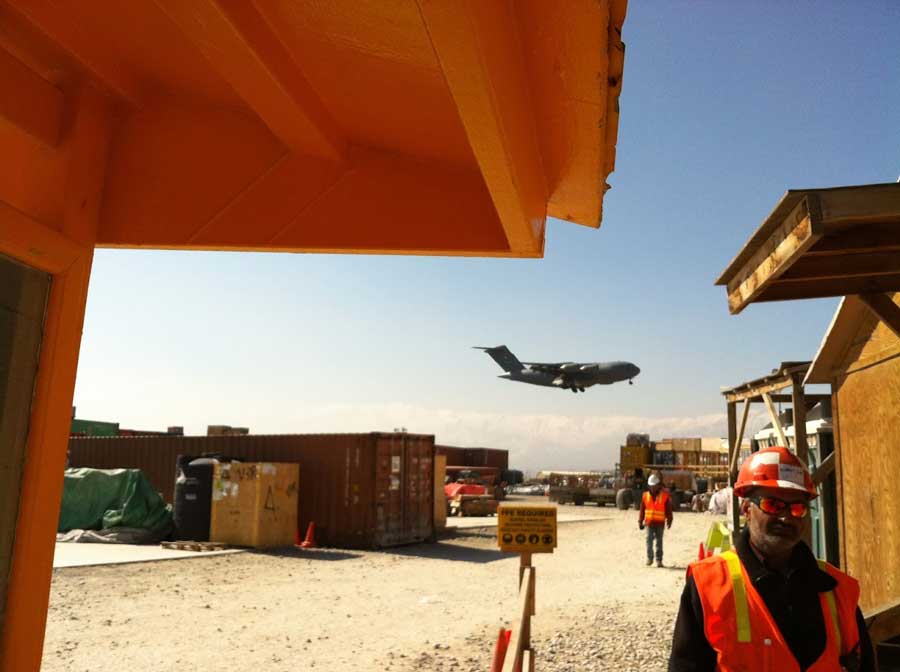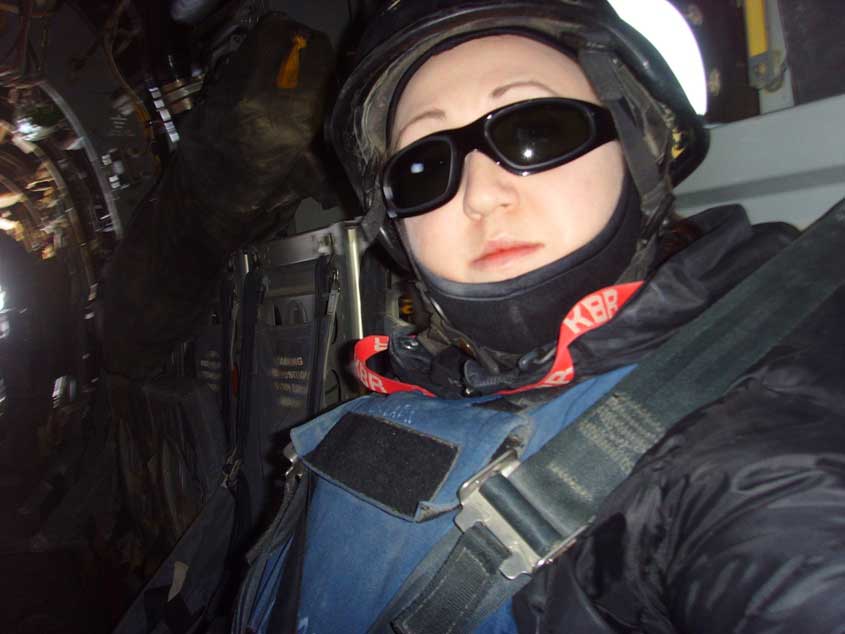Veterans Won Big With the PACT Act. Now, Civilian Military Contractors Are Starting Their Own Campaign When the country goes to war, it isn’t only the military that pays the price
Shay Dubis got to know the love of her life through a series of FaceTime calls from the other side of the planet.
She was just outside of Atlanta, he was in Afghanistan. She would call her future husband, Scott Dubis, on her way to work, talking with him right up until she clocked in, or in the middle of the night—whenever they could line up the nine-hour time difference.
“He would be on the phone with me some nights…and all of a sudden have to go, ‘Incoming, incoming!’” Shay said. She would wait, tense for hours, until she heard he survived the attack.

Shay and Scott Dubis. (Photo courtesy of Shay Dubis)
Scott was charming, an irrepressible prankster. He teased her constantly and could fix almost anything, on base in Afghanistan or, later, at the home they made for themselves in South Carolina.
Not long after they got married, Scott went back overseas, this time to Iraq. About two months later, two men knocked on Shay’s door. They were there to deliver devastating news: Scott had been killed. Shay was now a widow, just shy of her first wedding anniversary.
The men who came to her door weren’t wearing military uniforms—they were dressed in suits. Scott Dubis wasn’t a soldier, sailor, airman, or Marine. He was a civilian, employed as an armored vehicle mechanic by the military contractor ManTech.
If Scott had been on active duty, Shay would have been eligible for certain benefits. And people would have known her husband died serving his country.
But despite facing many of the same risks service members do, military contractors have little in the way of support or resources when they return home.
A new organization launching this month aims to change that. The Association of War Zone Contractors is the first nonprofit dedicated to organizing and advocating for the hundreds thousands of contractors the U.S. relies on in its overseas operations. Like generations of veterans before who have come home from battle, scarred physically and psychologically, and pushed for better care, the group hopes to draw attention—and eventually resources—to support contractors as they increasingly bear the costs of war.

Damage to military contractor equipment and spaces in Iraq. On left, a KBR truck after an IED incident; on right, the Fluor materials office after a mortar attack on Forward Operating Base Tillman. (Photos courtesy of Cory Archibald)
It may not be easy. The push comes at a time when the federal government is facing unprecedented cuts under the Trump administration. While military veterans have won benefits that contractors have not—most recently in the form of 2022’s PACT Act, a massive expansion of VA benefits—even veterans are worried their hard-won benefits may be on the chopping block.
Last week, the Senate rejected a non-binding resolution to protect funding for the PACT Act. The vote itself doesn’t change anything, but veterans worry it signals benefits could be at risk.
Still, Scott Dillard, the group’s founder, says that the country needs to recognize what happens when it goes to war. It isn’t only the military that pays the price.
“You’re missing at least half of the equation,” he says.
* * *

Fluor materials yard on Bagram Air Base, Afghanistan. (Photo courtesy of Cory Archibald)
About a thousand more U.S. military contract workers were killed in combat zones than active duty service members in the post-9/11 wars, a startling fact that mirrors the growing role that civilians play in overseas conflicts. Without a draft during the wars in Iraq and Afghanistan, a smaller military leaned heavily on private contractors for much of the work soldiers had done in previous wars—everything from patrolling security perimeters and guarding convoys to slinging mashed potatoes and changing light bulbs.
Dillard graduated from West Point in 2001 and deployed to Iraq and Afghanistan where he saw firsthand just how much soldiers relied on the civilian contractors who worked alongside them. Workers from the U.S. and subcontractors from far-flung foreign countries—from Macedonia to Uganda, from the Philippines to Nepal—all helped the American war effort.
When Dillard left the Army, he ended up heading back to Afghanistan as a contractor himself. In recent years, he’s worked to connect with other former contractors, tracking down ex-combat zone workers sick from cancers and lung diseases, and consoling spouses whose husbands or wives had died by suicide after their experiences.
“Every single thing that the VA does, and all the hundreds of veterans service organizations and veterans nonprofits doing what they do, there’s that exact same need on the contractor side,” Dillard says.
Contractors faced very real dangers while working on American bases: Mortar attacks, IED explosions, suicide bombings. And even after the wars ended, in many places contractors stayed. In fact, the U.S. ramped up the number of contractors in Iraq as it withdrew troops.
Scott Dubis, Shay’s husband, was killed by a drone strike in 2023.
“I finally found my person,” Shay said. “They viciously took him away from me before we even had a chance to live our life together.”
As a contractor on bases across the Middle East, Scott Dubis, like other civilian workers, breathed in the toxic fumes from burn pits. The military burned everything from medical waste to tires to unexploded ordnance in the massive open-air pits. But civilian workers who come home and face illnesses down the line don’t get the same benefits or assurances as their military counterparts who breathed in the same air.
Award-Winning Journalism in Your Inbox
Three years ago, when Congress passed the PACT Act, it officially recognized a connection between burn pits and 23 different cancers and respiratory illnesses—many of them rare—that troops were diagnosed with after serving in the Middle East.
Military and civilian doctors pointed to the connection for years, but the Pentagon and VA refused to acknowledge a link between burn pit exposure and these medical conditions. So veterans began to organize, drawing inspiration from 9/11 first responders who had successfully lobbied for compensation from the government for the cancers and respiratory diseases they got after breathing in toxic dust at the World Trade Center site.
It took a concerted years-long advocacy effort by affected veterans and advocates, culminating in a 24/7 “firewatch” of veterans keeping vigil on the steps of Capitol Hill, for lawmakers to finally pass the PACT Act. Now, contractors want to replicate those efforts.
“I talked to so many contractors throughout these 13, 14 years,” said Rosie Torres, the founder of Burn Pits 360, a nonprofit that pushed for the PACT Act’s passage. “It was gut-wrenching and heart-wrenching. These are human beings, and to … exclude them and say, ‘Well, you’re on your own,’ it’s really a little barbaric.”
* * *
Civilian contractors do have some recourse in the form of a 1941 law called the Defense Base Act, which requires contracting companies’ insurers to pay for injuries and illnesses sustained on American bases.
But the claims process can be laborious and the payouts small, if they even come. And although VA now officially recognizes an automatic link between certain illnesses and burn pits, the Department of Labor, which oversees the civilian process, does not: Each contractor must prove a connection between their medical condition and employment.

Cory Archibald traveling aboard an Osprey between bases in Iraq around 2008. (Photo courtesy of Cory Archibald)
The Association of War Zone Contractors says that it is working first to connect contractors, hoping to provide them with the sense of community they lose when they return home from war, and eventually providing a mental health hotline. But ultimately, they hope to convince lawmakers that the government should bear some responsibility for their care.
To do that, they are following the playbook of veteran activists, launching a burn pit registry to collect data on contractors’ exposure and medical conditions.
“There is no central repository for medical information, and so there’s no way for anyone to just accidentally discover, ‘Oh, we also have a bunch of contractors that have these same cancers,’” says Cory Archibald, the association’s president.
The group is collecting information from contractors living in the United States, as well as the thousands of foreign workers subcontracted by American companies to work on overseas bases.
A burn pit registry started by Burn Pits 360 collected medical data on servicemembers that could be analyzed by independent medical experts, ultimately providing much of the data that helped convince lawmakers to pass the PACT Act.
“Those 23 conditions [in the PACT Act] came from our database,” Burn Pits 360’s Torres says. “Collecting data not just gives you access to the people, the stories, but it allows you to go to Congress and say, ‘It’s not a coincidence.’”
Archibald points out that while troops often served multiple deployments in Iraq or Afghanistan, some contractors stayed even longer—sometimes working at the same base for up to a decade—meaning their exposure to burn pits could be even greater.
“This burn pit registry is the first step in that direction, to prove that there are people who served alongside our troops who were exposed often for longer periods of time, often at greater intensity,” she said. “There needs to be benefits paid and accountability.”
* * *
What exactly that might look like remains unclear, particularly as the federal government rapidly shrinks. Dillard says one option could be to streamline the Defense Base Act claim process, so that the burden of proving a connection between an illness and toxic exposure on a military base is less onerous to the contract workers—and perhaps to the government. Claims can take years to process, with judges evaluating competing evidence from workers and insurance companies.
A Department of Labor spokesperson told The War Horse last year that the department receives about 15,000 Defense Base Act claims each year, and that “any significant increase in incoming claims without additional resources would prove challenging.” The Trump administration has said that it hopes to cut up to 10% of the federal workforce.
There’s also direct financial compensation, an idea with some precedent. Although 9/11 first responders were not federal workers, the government established both a financial compensation fund and a health benefits program for workers from Ground Zero—though funding for the programs was left out of the current government spending plan, and personnel cuts at the Centers for Disease Control and Prevention this month reduced the health program’s staff by 20%.
An even clearer parallel may be the Merchant Marines, civilian mariners who support the Navy in war time. Some merchant mariners who served in World War II, when some 8,500 mariners were killed, were eligible for full veterans benefits.
Our Journalism Depends on Your Support
“We have battlefield contractors that were being exposed to all the same things in an active war zone,” says Chuck Dunn, who set up mental health services for contracting companies in war zones and now works as an advisor to the new group. “I don’t see it as much different than what we did with the Merchant Marines.”
“Whether or not our government’s going to agree with that,” he says, “is a whole other story.”
But the organization says it needs to try.
“People came home in prior wars, and they didn’t have that support at home,” Archibald says. “We as a society made a conscious effort to change that and to recognize that people who served in war zones came home and needed support.
“Now we’ve outsourced a big chunk of those jobs, and all the people who those jobs were outsourced to are not getting that support.”
To learn more about the Association of War Zone Contractors or to join the burn pit registry, go to www.becounted.org.
This War Horse story was reported by Sonner Kehrt, edited by Mike Frankel, fact-checked by Jess Rohan, and copy-edited by Mitchell Hansen-Dewar. Hrisanthi Pickett wrote the headlines.





Comments are closed.